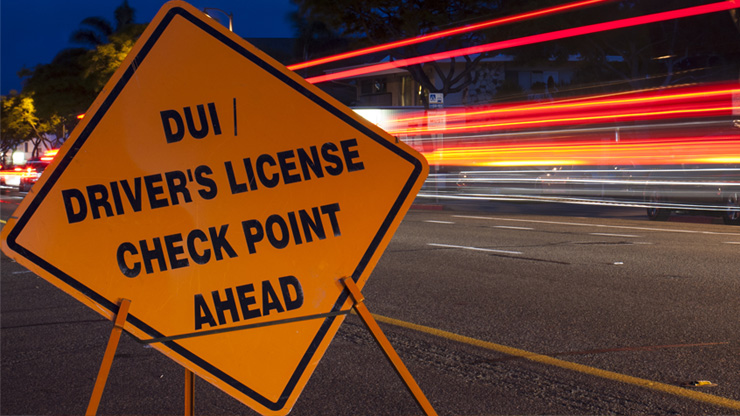
Most drivers, at some point in their life, have driven through some form of a police checkpoint. Checkpoints can be set up for a variety of reasons depending on the Law Enforcement goals, which typically include: Detection of impaired drivers, seatbelt checks, license checks, etc. The common setup for a checkpoint is to have one supervising officer directing traffic to different stations within the checkpoint. Each station would have a specific purpose and it is staffed with at least one officer. The usual stations include:
The majority of checkpoints are set up for the purpose of catching drunk drivers and are usually conducted in the late night or early morning hours when motorists are more likely to be intoxicated.
When setting up a checkpoint there are several things the police have to do to ensure that the random stopping of vehicles does not run afoul of the motorists constitutional rights. The 4th amendment of the constitution provides that citizens should be free from unreasonable searches and seizures by the police. Even when initiating a traffic stop, a police officer must have probable cause to believe the driver committed a traffic violation prior to stopping that vehicle. Which begs the question, how can the police establish a checkpoint that randomly stops vehicles without probable cause and still pass constitutional muster?
The United States Supreme Court addressed this Issued when the Michigan State Police set up their first DUI checkpoint in 1986. Originally the case was thrown out at the State level as being a violation of the 4th amendment, however, the US Supreme Court reversed the ruling by saying that checkpoints can pass constitutional muster, as long as they comply with several requirements. Additionally, the Illinois Supreme Court has also ruled that DUI checkpoints are constitutional under certain circumstances, but requires the police to follow several well established protocols.
The courts apply a balancing test to determine whether a DUI checkpoint is constitutional. Should the State fall short in showing these factors, then the checkpoint can be ruled unconstitutional and any evidence collected as part of the checkpoint would be barred in court. Listed below are the 5 prongs Illinois Courts will look for when determining the constitutionality of a DUI roadblock.
If the State falls short on these elements, then it is likely that the evidence may be suppressed and the arrest can be quashed. Amazingly, it is often the case that the majority of checkpoints do not adhere to these strict standards promulgated by the Supreme Court. An attorney that is familiar with roadblock litigation would be able to take advantage of this and be able to file a motion to suppress evidence and quash arrest that could possibly lead to a dismissal of any charge that resulted from the unconstitutional roadblock.
Yes, when an officer request identifying documents or insurance when you are operating a vehicle, you must provide the officer with this information. Should you refuse this request, it is possible that you could be charged with obstruction.
Yes. There is a lot of information on the internet that seems to suggest that you may just roll your window down slightly to provide the officer with requested documents. While you may initially roll your window down partially to provide documents, the officer may request that you roll you window all the way down. Courts have rule that this request does not violate the constitution and non-compliance could lead to additional charges.
This is more of a grey area when it comes to a checkpoint, because police interaction during a checkpoint is required to be kept at a minimum unless there is good reason to ask the motorist to get out the car. In the context of an ordinary traffic stop, the police officer may at anytime order you to exit your vehicle, as long as the stop isn’t prohibitively delayed. While in a checkpoint scenario, the officer would need some type of reasonable suspicion before expanding the scope of the stop. Should an officer ask you to step out your vehicle, it is always a good idea to comply with the request. Should this request turn out to be unlawful, the courts could then suppress any evidence obtained as a result of the unlawful detention.
While you have to provide the officer with your ID, or information regarding your identity, any futher questions asked by the officer are not required to be answered. Any questioning initiated by the officer is usually done to obtain inculpatory statements that are not in your best interests. As attorneys, we always advise our clients not to subject themselves to questions from law enforcement without an attorney present. However, we do suggest that you remain cordial with law enforcement when declining to be questions.
No…ish. You are never required to participate in Field Sobriety Testing and you cannot receive additional charges for your refusal to do so. However, new laws in Illinois can lead to a suspension of driving privileges should a motorist refuse field sobriety testing when they are suspected of being under the influence of drugs. If the motorist is suspected of being under the influence of alcohol, there will be no license suspension for refusing sobriety testing. Additionally, if the officer seeks to suspend your license for a refusal of testing pursuant to a drug based DUI, the officer must first read a warming to motorist which will detail the penalties for refusal.
You are never required to take a breathalyzer. However, refusing to do so could lead to a suspension of your driver’s license. Prior to asking for a breathalyzer, the police must read you the consequences of a refusal call the warning to motorists. Also the license suspension would only be pursuant to a refusal of a certified breathalyzer (usually the machine at the police station) and not for refusing a portable breathalyzer (a handheld unit police carry in their car)
This is a portable unit that police carry with them in their car. The result of a portable breathalyzer is not admissible in a trial setting, which has led some police officers to say things like“Just blow into it, I can’t use it in court anyway”. This statement is false and portable breathalyzers may be used in court for all hearings except trials. For instance, PBT results are admissible in Statutory Summary Suspension hearings, Motions to suppress Evidence, and motions to quash arrest. Usually the portable breathalyzer is used to obtain evidence to establish probable cause for a DUI arrest.
This is the warning that must be read to a motorist prior to either field sobriety testing for drug based DUIs or chemical testing for all DUIs. This warning informs the motorist of the possible ramifications to their driver’s license should they refuse to submit to testing. If the arresting officer fails to read the warning prior to conducting testing, then the tests would be subject to suppression and the resulting license suspension would be subject to being rescinded.
